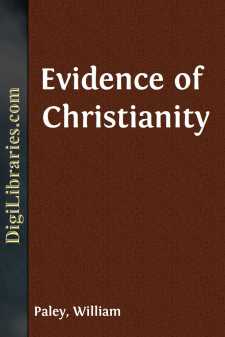Categories
- Antiques & Collectibles 13
- Architecture 36
- Art 48
- Bibles 22
- Biography & Autobiography 813
- Body, Mind & Spirit 141
- Business & Economics 28
- Children's Books 12
- Children's Fiction 9
- Computers 4
- Cooking 94
- Crafts & Hobbies 4
- Drama 346
- Education 46
- Family & Relationships 57
- Fiction 11826
- Games 19
- Gardening 17
- Health & Fitness 34
- History 1377
- House & Home 1
- Humor 147
- Juvenile Fiction 1873
- Juvenile Nonfiction 202
- Language Arts & Disciplines 88
- Law 16
- Literary Collections 686
- Literary Criticism 179
- Mathematics 13
- Medical 41
- Music 40
- Nature 179
- Non-Classifiable 1768
- Performing Arts 7
- Periodicals 1453
- Philosophy 64
- Photography 2
- Poetry 896
- Political Science 203
- Psychology 42
- Reference 154
- Religion 513
- Science 126
- Self-Help 83
- Social Science 81
- Sports & Recreation 34
- Study Aids 3
- Technology & Engineering 59
- Transportation 23
- Travel 463
- True Crime 29
Evidence of Christianity
by: William Paley
Categories:
Description:
Excerpt
PREPARATORY CONSIDERATIONS.
I deem it unnecessary to prove that mankind stood in need of a revelation because I have met with no serious person who thinks that, even under the Christian revelation, we have too much light, or any degree of assurance which is superfluous. I desire, moreover, that in judging of Christianity, it may be remembered that the question lies between this religion and none: for, if the Christian religion be not credible, no one, with whom we have to do, will support the pretensions of any other.
Suppose, then, the world we live in to have had a Creator; suppose it to appear, from the predominant aim and tendency of the provisions and contrivances observable in the universe, that the Deity, when he formed it, consulted for the happiness of his sensitive creation; suppose the disposition which dictated this counsel to continue; suppose a part of the creation to have received faculties from their Maker, by which they are capable of rendering a moral obedience to his will, and of voluntarily pursuing any end for which he has designed them; suppose the Creator to intend for these, his rational and accountable agents, a second state of existence, in which their situation will be by their behaviour in the first state, by which suppose (and by no other) the objection to the divine government in not putting a difference between the good and the bad, and the inconsistency of this confusion with the care and benevolence discoverable in the works of the Deity is done away; suppose it to be of the utmost importance to the subjects of this dispensation to know what is intended for them, that is, suppose the knowledge of it to be highly conducive to the happiness of the species, a purpose which so many provisions of nature are calculated to promote: Suppose, nevertheless, almost the whole race, either by the imperfection of their faculties, the misfortune of their situation, or by the loss of some prior revelation, to want this knowledge, and not to be likely, without the aid of a new revelation, to attain it; under these circumstances, is it improbable that a revelation should be made? Is it incredible that God should interpose for such a purpose? Suppose him to design for mankind a future state; is it unlikely that he should acquaint him with it?
Now in what way can a revelation be made, but by miracles? In none which we are able to conceive. Consequently, in whatever degree it is probable, or not very improbable, that a revelation should be communicated to mankind at all: in the same degree is it probable, or not very improbable, that miracles should be wrought. Therefore, when miracles are related to have been wrought in the promulgating of a revelation manifestly wanted, and, if true, of inestimable value, the improbability which arises from the miraculous nature of the things related is not greater than the original improbability that such a revelation should be imparted by God.
I wish it, however, to be correctly understood, in what manner, and to what extent, this argument is alleged....


